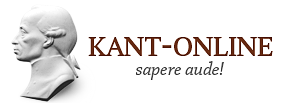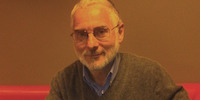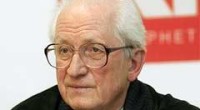Vadim Chaly, Alexander Kuteynikov. Kant’s Political Ideas and Contemporary Theories of International Organization
Among many areas of philosophy where Kant is regarded as a great classic, lies theory of international organization. This sphere of international relations, or IR, theory is experiencing rapid groth during past decades, as international organizations rise to prominence. In recent literature on the subject Kant is mentioned with increasing frequency. Our paper is a step towards developing a Kantian theory of international organization.
Such theory has to be developed, since Kant’s philosophy does not contain a fully fleshed out theory of international organization. His ideas on this topic are general in outline and limited in scope. However, they have a rich and profound philosophical foundation, they are part of a coherent and complex system. Ideed, our present task is not that of building, but that of sculpting — recreating details in Kant’s boldly designed political project, revealing its features — as well as, perhaps, its limitations and contradictions.
Kant’s political project was bold. At the time of its conception it almost seemed a philosophical joke — Kant’s apt understanding of this is evident in his ironic tone. Yet as time went by, it attracted followers, acquired new meaning and saw a number of attempts to be implemented — with increasing degree of success.
In order to recontruct Kant’s theory of international organization, one has to go beyond the plan of perpetual peace and place it in broader context of Kant’s moral philosophy. Of major importance here are his ideas of international and cosmopolitan law, discussed in “Metaphysics of Morals”, and also his reflections on ends and perspectives of social and political relations, expressed in his other (so-called) “minor political works” — “Idea for a Universal History with a Cosmopolitan Purpose”, “On the Proverb…” Most importantly, we must take into account Kant’s anthropology — as the question “What is Man?” is the key to political theory.
The fact that Kant’s theory presupposes active role of international organizations in global political processes is beyond doubt in recent literature. However, Kant’s idea of global federation of states aiming to establish peace is innovative, but not very precise. He is looking for words to frame his idea — Foederalitaet, Verbindung, Genossenschaft (Hinsley, 1967; Hurrell, 1990). Still, his view that such body is necessary is clear and has had immence influence.
But is there place for other international organizations, and if so, what defines their role? In their 2001 book “Triangulating peace” Bruce Russett and John Oneal claim that if we translate Kant’s peace project into the terms of modern political theory, the necessary role of international organizations will be evident. According to Russett and Oneal, Kant’s program rests on three pillars: representative democracy, economical interdependence and international organizations (Russett, 2001, p. 29). The role of international organizations is fostered by representative democracy: the contractual, or consensual, nature of political relations that is inherent in this regime is projected outside, creating the basis for international law, which in turn serves as an environment for a variety of international organizations.
Thus, the question “does Kant’s theory provide for a variety of international organizations” gets a clear positive answer. The question of limits of their power is more controversial. Does Kant’s theory of international relations support modern liberal ideas of “global governance”, carried out not only by state, but also non-state political actors? Does it envisage a cosmopolitan future, where national states become redundant? Or are international organizations mere tools for channelling state policies and buffering their conflicts?
To answer these questions, we have to look into an ongoing debate concerning the relationship of statist and cosmopolitan tendencies in Kant’s political philosophy. If states are fundamental players in the field of international politics, are autonomous subjects of immence size, then, clearly, international organizations are relegated to the latter role — that of tools. If, however, cosmopolitan tendencies outweight the statist ones, then international organizations become entities on par with — if not superceeding — national states.
In recent anglophone literature the statist interpretation seems to find much support. Such authors as Francis Harry Hinsley and Andrew Hurrell claim that it is thoroughly supportet by Kant’s political texts, particularly by “Towards Perpetual Peace”. Kant’s pronounced opposition to global government is perhaps the strongest argument for statism. Hinsley wrights that for Kant: “it was no more logical to hope to solve the international problem by the supersession of the state than it would have been to try to end the civil strife by the abolition of individuals” (Hinsley, 1967, p. 69) Statists are clear: states are like individuals, they are basic. On statist reading, Kant sees the place for only one important international organization — the federation of states — established for the sole purpose of maintaining peace.
The cosmopolitan side of Kant’s interpretators is represented by Martin Wight and Hedley Bull. For them the interaction of national states is seen by Kant as an intermediary stage in the process of the formation of global society. This society will consist not of states, but of individuals and their free associations — i. e. international organizations.
While statist interpretation rests on citations from Kant’s political works, the cosmopolitan one claims to rest on deep anthropological assumptions of Kant’s philosophy, developed beyond his political treatises. The centrality of autonomous person in Kant’s system ultimately makes the role of state secondary and, perhaps, temporary. After all, our nationality is accidental, and so to most is citizenship, they belong to the world of nature, whereas association in international organizations has at least a strong element of choice, and so at least partly belongs to the world of freedom. So the gradual transition of political power from traditional actors to more sophisticated ones is, from Kantian-cosmopolitan point of view, a sign of rationalization of political process, a sign of overcoming our “self-incurred immaturity”.
So is there a conflict between statism and cosmopolitanism in Kant’s philosophy, and so a clash of two opposing views of the nature of international organization? Perhaps not. Perhaps we should discern two layers in Kant’s theory of international relations — one realist, or empirical, the other idealist, or transcendental. We might also call them “tactical” and “strategic”, with his political treatises focusing on immediate solutions (and such is “Toward Perpetual Peace”, which, despite irony, is a plan containing immediate guidelines — the preliminary articles), and his works on anthropology and philosophy of history discussing the end results, or transcendental aims. Accordingly, we may discern “tactical” and “strategic” perspectives for international organizations: mere tools to implement particular policies of the national states at first, they will gradually grow in significance, acquire independence, and perhaps supersede national states as we know them.
Kant’s project described only one of the possible versions of international regulation. In the end of XVIII century Russian thinker Vasiliy Malinovsky proposed his project of a common Union of Europe («общий союз Европы») (Malinovskij, 1958, s. 76). Malinovsky was not a philosopher, although he graduated from philosophical faculty in Moscow. Kant as well as Malinivsky pointed at one of the dominant tendencies of the world evolution.
Eleven years after Kant’s death the first permanent international multilateral body was established by Russian, Austrian and Prussian monarchs. The initiator was Alexander the First, at the time the most powerful tsar of the world. Fedor Martens, a well-known nineteenth-century Russian lawer, called The Holy Alliance a revolution in the world history. It was not a federation, but this new type of union of states was open for all European Christian powers. It was not an instrument for democracy promotion, but a mechanism for status quo maintenance, which was seen in support of monarchism. The idea of The Holy Alliance was peace protection, but for this, Union authorized military intervention to Naples, Sardinia, Spain for suppressing revolutions.
Only a century later, in the beginning of 1910s, a kind of international theory, similar to speculative provisions held by Kant, was created. Today this speculative paradigm is known as idealism or liberal internationalism or utopianism. Liberals see international relations as a realm of potential progress and purposive change. Liberals somewhat slyly believe that peace and stability can be established among sovereign states as well as within states, if the power of states will be reduced. Normann Angel, Woodrow Wilson, Alfred Zimmern were the founders of this paradigm. Kantian political ideas form an integrative part of international liberalism and of the big cluster of theories springing from it: federalism, constructivism, functionalism.
Let us briefly restate the main common points of this cluster of theories:
1. The absolute necessity to restrict international anarchy and reduce incentives for states to engage in behavior that privileges their short-term interests over the collective interests. The nature of this collective interest remains a question to discuss.
2. The proof of the necessity of international regulation with IOs’ permanent assistance. IOs help to stabilized the processes as well as foster common values and ideals. At the extreme of this view the International Organisations are considered to be the basis of international system, whether they are seen as flexible non-formal meeting points or as strong authoritarian bodies with political and juridical power.
3. The activities of individuals are main factors, a kind of engine for International Organisation’s creation and evaluation.
4. Creation of a non-state mechanism to regulate and to govern the world, controlled by the relevant political elites. Kant himself only hinted at this way of thinking, he did not openly proclaim plans of abolishing states.
When comparing Kant’s political ideas to contemporary theories of international organization and to actual development of such organizations, one is tempted to conclude the following:
1. The formation and development of international organizations and other multilateral international structures is determined by universal social laws.
2. Kant’s treatise is a vivid inaction that philosophy does have a prognostic function. Even if “Perpetual peace” was partly intended as a philosophical joke, it effectively predicted the future of multilateral structures. The theory of idealism has another name — utopianism; however, many of the ideas that at some point in history were widely regarded as utopian, have become a reality.
3. There exist two seemingly conflicting interpretations of Kant’s theory of international relations. One considers it statist, the other — cosmopolitan. However, these interpretations need not conflict. Kant’s theory of international relations has two levels: one can be called “tactical”, it addresses immediate issues, and is statist; the other can be called “strategic”, it contains a scheme of future development of international relations based on Kant’s understanding of universal laws of social reality, on his anthropology, and it is cosmopolitan. These two levels influence two different paradigms of understanding international organizations. The first paradigm supposes that the political power and capacity to act is the property of states. International organizations, therefore, are seen as a resultant of wills of states. The second paradigm postulates the existence of non-state political power: supranational, or transnational, or global. Nowadays this paradigm experiences rapid development. It seems to be particularly successful in explaining contemporary political phenomena, and so is predominant.
Kant, probably, was not a strong advocate of dialectics point of view to social and political processes, but the analysis of Kant’s political philosophy serves as a good basis for dialectical understanding that international organization forms as the result of these two processes.
The bibliography
Bull H., 1979: Anarchical society. 2nd ed. N. Y.
Diehl P. F. (ed.), 2005: The Politics of Global Governance. International Organizations in an Interdependent World. 3rd ed.; Boulder, London.
Hinsley F. H., 1967: Power and the pursuit of peace. Theory and Practice in the History of Relations Between States. Cambridge.
Hurrell A., 1990: Kant and the Kantian paradigm in international relations, in: Review of International Studies. Vol. 16. Issue 03. July.
P. 183—205.
Kutejnikov А. Е., 2012: Svjaščennyj sojuz — pervaja v istorii stabil’naja mnogostoronnjaja meždunarodnaja struktura, in: Voprosy istorii . Nr. 4. S. 116—123.
Malinovskij V. F., 1958: Rassuždenija о mire i vojne, in: Malinovskij V. F. Izbrannye obščestvenno-političeskie sočinenija. М.
Martens F. (Sostavitel’), 1878: Sobranie traktatov i konvencij, zaključennych Rossieju s inostrannymi deržavami. Т. IV. Čast’ I: 1815—1849. SPb.
Russett B., Oneal J., 2001: Triangulating Peace: Democracy, Interdependence, and International Organizations. N. Y.
Sergunin А. А., 2012: Teorija meždunarodnych otnošenij Immanuila Kanta. Nižnij Novgorod.
Wight M., 1987: An anatomy of international thought, in: Review of international studies, 13, 3. P. 221—227.
This article was firstly published in collected articles «Kant’s project of perpetual peace in the context of contemporary politics” (2013):
Chaly, Vadim, Kuteynikov, Alexander. Kant’s Political Ideas and Contemporary Theories of International Organization// Kant’s Project of Perpetual Peace in the Context of Contemporary Politics : proceedings of international seminar/ ed. by A. Zilber, A. Salikov. — Kaliningrad : IKBFU Press, 2013. S. 123 – 129.




